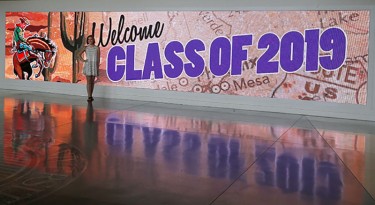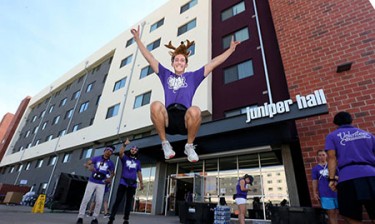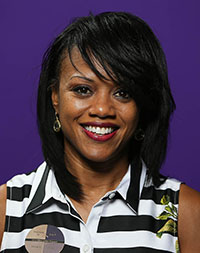Story by Janie Magruder
Photos by Darryl Webb
GCU News Bureau
Grand Canyon University students can’t yet see the finish line of the 2015-16 academic year — after all, it’s only the fourth day of classes. But GCU’s 16,000 traditional students, including 7,000 newcomers, have never had more tools to help them set a successful college pace and sprint across at the end.
The University has expanded a variety of learning components and measurements that, among other functions, provide timelines and reminders to students about courses, volunteer work, internships, spirituality and networking experiences to best prepare them for the future.
From Honors College upperclassmen who warmed up incoming freshmen at summer orientation sessions to college deans who are on a whirlwind of student meet-and-greets during the first weeks of school, everyone is on board, said Dr. Antoinette Farmer, vice president of institutional effectiveness.
“We have introduced intentional and integrated advising, which coordinates program, career, academic support and spiritual components necessary for students to be successful from Day 1,” she said. “It promotes consistent conversation among students, faculty, student services advisers, Career Services and Spiritual Life. We are helping students through the entire process of finding their purpose, which begins and ends with purposeful planning.”
First Year Center opening soon
Through the First Year Experience, GCU freshmen receive a roadmap for navigating campus life, from dining and discounts to technical support and public safety. By the middle of September, the University plans to open its First Year Center in Juniper Hall, a new freshmen residence in The Grove. Juniper is the home of about 250 of GCU’s 750 Honors College students.
It will be a one-stop shop for freshmen who need academic, psychiatric and spiritual assistance of any kind. Peer tutoring and other support will be available at all times of the day and night, weekends, too, and faculty will drop by periodically to greet and work with their students.
“Our message is, ‘Here’s a hand — just grab it,’” Farmer said.
The First-Year Center will be a unique place where academics and social activities come together. Reyna Mosely, an Honors College senior, said she wishes such a place had existed when she was new to campus.
“If students are confused about anything, we will be the middle man for them and all the resources GCU has, and we’ll be able to point them in the right direction,” said Mosely, a biology major with an emphasis in pre-Physician Assistant who works on the First Year Experience team.
“It’s all about making these connections, and I feel really blessed to help these students make it through their own journey,” she said.
Faculty are looking forward to being part of the center, too, said Jessi Farmer, an assistant communication professor in the College of Humanities and Social Sciences (CHSS).
“It will be exciting to see how we bring together this collaborative learning environment with traditional academic approaches,” she said.
Planning down to a science
Antoinette Farmer is enthused about the new purpose-planning process, by which students are given specific academic support that fits their courses, majors and career goals.
“Students may know what they want to do, but they may not know how to get there, and that can be overwhelming,” she said.
The plan directs freshmen to the GCU Learning Lounge or another academic excellence center on campus, where they may obtain homework help and sign up for content clinics. It also provides year-by-year checkpoints and recommendations on the academic, career and spiritual plans of all students, no matter their year in school.
“The intent is to help make sure that students, from their freshman year to their senior year, are taking advantage of all the resources at GCU,” said Jessi Farmer, who, with psychology professor Laura Terry, developed the purpose plan for CHSS.
A sampling from each year’s plan:
- Freshmen: Review your program of study and four-year course walk, set a target GPA goal and a plan to achieve it, join a learning community in your college to connect with peers sharing common academic goals and interests, note your professors’ office hours, review your class schedule, sign up for a content clinic to get help for a challenging course, find a job on campus, attend an interview workshop with Career Services and create an online career-assessment tool.
- Sophomores: Consider a leadership or mentoring role at GCU, discuss options for a minor or double major with your adviser, research graduate schools, maintain your target GPA, review your career-assessment tools, attend a guest speaker event to learn from an established professional in your field and consider joining a professional organization.
- Juniors: Finalize your graduation path with your adviser, register and take graduate school admissions tests if needed, create or update your resume and letters of recommendation, seek internship opportunities and attend Career Week sessions on etiquette, resume review, mock interviews and jobs/internships.
- Seniors: Explore professional research circles and opportunities, stay involved in your college’s learning communities, finalize your career plan with your adviser, complete graduation application and connect with alumni relations to start building lifetime connections.
In each year, joining a faith community, church, Bible study or small group is emphasized, too.
Tracking academic progress
Because math, which often is surrounded by phobias, is among the subjects that can make or break a student’s college experience or career path, Antoinette Farmer said, GCU has developed variables that enable the University to determine the probability of success among students in each section of math offered. The tools pinpoint the concepts the student is struggling with and the point in the semester — to the week — that his or her comprehension is falling off. The data has been made available to faculty and used as an early alert system to obtain help for the student, she said.
The tools pinpoint the concepts that the student is struggling with and the point in the semester — to the week — that his or her comprehension is falling off.
“At that point, we can add learning advocates (leads or peer tutors) or instructional aids, tools and other assistance to help them be more successful,” she said. “Young people can get other students excited about these tools in ways that the rest of us may not be able to.”
The new learning tools are designed to enhance, not replace, faculty attention and expertise, Jessi Farmer said. For example, math and science tutors may be floaters in those classes to provide extra help.
“Even in small classes, it’s hard to get to everyone, and what’s great is that they are on campus when we can’t be, and they are in places on campus where we aren’t, too,” she said.
Faculty also will give prompts in the classroom about guest speakers and career-enhancing events and remind students to periodically check their progress plans, she said.
“This helps us helps students transfer from backpack to briefcase,” she added.
Antoinette Farmer credited part of student success to the continued support of the faculty and to Bret Miller, academic affairs research and analytics program manager. Miller worked with Dr. Joe Veres, director of K-12 Outreach Programs, and the colleges to build important tools for their faculty.
“These include a Math and English Faculty Dash, which provides an indication of student experience and preparedness within these respective areas, and Early Alert Trending for all courses, which provides a historical view of the number and type of early alerts,” she said. “These let faculty know where, when and how students normally struggle within the respective courses.”
Contact Janie Magruder at (602) 639-8018 or [email protected].






































































